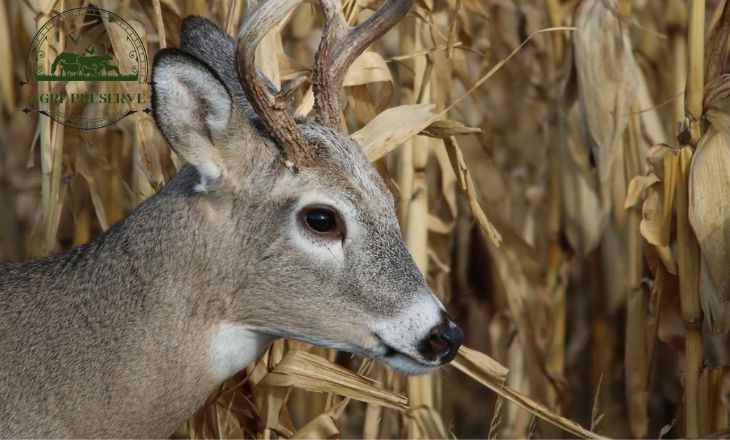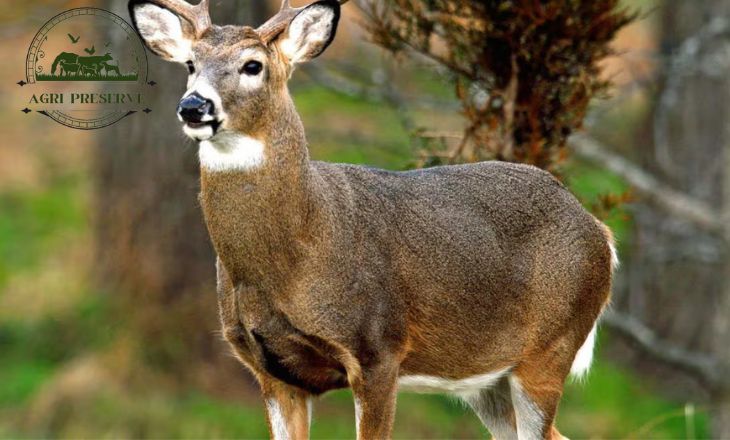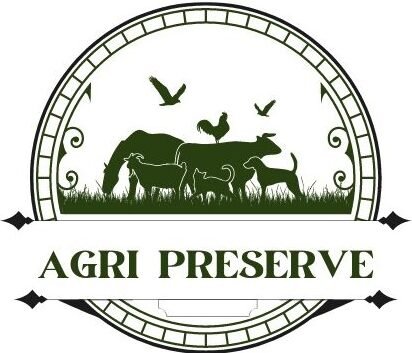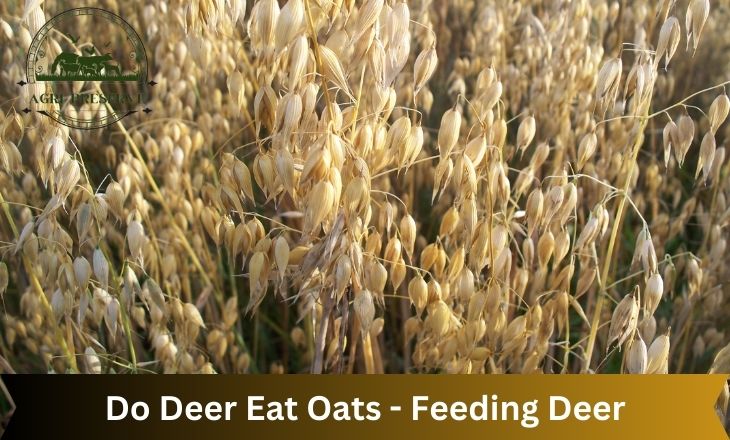Imagine waking up to the sound of leaves rustling outside your window and seeing a deer eating oats. Is this a fairy tale or reality? Let’s explore whether do deer eat oats and what influences their food choices. Let’s uncover the truth about deer and oats in the wild.
do deer eat oats
Deer mostly eat plants and vegetation in their habitats. They prefer high-protein plants like clover, alfalfa, or soybeans over oats. But when food is scarce, they may eat oats. This can happen when they find oats in fields or gardens.
Oats have more carbohydrates and less protein and minerals, essential for deer nutrition. Eating too many oats can cause digestive problems for deer because of their high fiber.
Deers will choose more nutritious food in their natural habitat but eat oats if necessary.
whole oats for deer
Deer can eat whole oats, which are rich in carbs and protein. This gives them energy, especially in winter when food is scarce. Oats also have fiber, which helps with digestion and keeps deer healthy. Oats are good in all weather and can be scattered on the ground or mixed with other food to attract deer for watching or hunting.
By giving deer whole oats, hunters and nature lovers can help keep the deer population healthy and give them a tasty treat.

different type of oats
There are different types of oats available for consumption. Like Whole Oats Groats, Scottish Oats, Oat Bran, and Raw Oats.
Whole Oat Groats
Whole oat groats are the purest form of oats, consisting of the whole kernel, including the bran layer, germ, and endosperm. These unprocessed kernels provide a chewy texture and slightly sweet flavor, enhancing sweet and savory dishes.
With their higher fiber content and slower cooking time, whole oat groats offer a wholesome option for those looking to add more nutrients to their diet while enjoying a satisfying meal.
Scottish Oats
Scottish oats, known for their coarse texture and nutty flavor, are a traditional staple in Scottish cuisine. They’re created by stone-grinding whole groats into smaller pieces, resulting in a hearty and robust oatmeal that is creamy and chewy when cooked. This unique processing method retains more of the natural oils in the oats, giving them a richer taste than other varieties.
Oat Bran
Oat bran is often hailed for its high fiber content and cholesterol-lowering properties. It is derived from the outer layer of the oat groat, making it rich in soluble fiber known as beta-glucan. Incorporating oat bran into your diet can help improve digestive health, promote satiety, and regulate blood sugar levels.
Whether sprinkled over yogurt or added to baked goods for an extra nutritional boost, oat bran offers versatility and numerous health benefits.
Raw Oats
The type of raw oats you use can change how your oatmeal or baked goods taste and feel. Rolled oats work well in baking because they keep their shape but are still soft when cooked. Steel-cut oats give a nice texture to porridge and breakfast bowls. Instant oats are quick but may not have as many nutrients as other types.
can deer eat uncooked oatmeal
Deer eat various plants and can also eat grains like corn and oats. They don’t usually eat uncooked oatmeal, but a little bit as a treat is okay. Oats give deer energy and some nutrition when eaten raw. But too much uncooked oatmeal can make deer sick.
is it safe to eat oats raw
Deer, if you’re wondering if eating raw oats is safe, the answer is yes. Raw oats have more nutrients and enzymes that are good for your stomach. They are easy to digest and give you energy. The sugars in raw oats can quickly become fuel for your body, helping you move easily. So, feel free to snack on raw oats, but don’t overeat.
benefits of eating oats every day
Deer in the forest look for food to stay strong and energized. Eating oats is good for your health. Oats have fiber that helps with digestion and makes you feel full longer. This allows deer to stay solid and agile. Oats also have essential nutrients like iron and magnesium that help deer have healthy muscles and bones.
Eating oats regularly gives deer the nutrients they need for their active lifestyle. The carbohydrates in oats give deer energy to stay focused during their daily activities in the forest. Eating oats daily can improve your health and vitality, just like for deer in the woods.
whole grain oats health benefits
Whole grain oats are a powerhouse of nutrients that contribute to overall well-being.
bright heart health
They benefit heart health due to their high fiber content and potential to lower cholesterol levels, but they also contain antioxidants that help combat oxidative stress.
antioxidants health
Whole grain oats are a powerhouse of antioxidants, helping to combat the harmful effects of free radicals in the body. These antioxidants are crucial in reducing inflammation and lowering the risk of chronic diseases such as heart disease and cancer.
protein to muscle
Oats are packed with protein essential for muscle growth and repair. This makes them an excellent choice for those looking to enhance their athletic performance or simply maintain a healthy lifestyle.
High fiber content
The high fiber content in whole grain oats benefits digestion and overall gut health. Fiber helps regulate blood sugar levels, keeps you full longer, and promotes regular bowel movements. Including whole-grain oats in your diet can support a healthy digestive system and reduce the risk of constipation and bloating.
Oats as a Food Source In Winter
In winter, when food is scarce for deer, oats are a good source of nutrition. Oats are high in carbohydrates, which give deer the energy they need to stay warm. Deer can easily digest oats, so they are a good food choice when other options are limited.
Oats can also help deer stay warm by boosting their metabolism. Scatter oats in areas where deer often go to attract them for feeding. This makes it easier to watch deer and study their behavior up close. Including oats in a deer’s diet in winter helps them survive and keeps the ecosystem balanced.
Oats for White-Tailed Deer
White-tailed deer are common in North America and are essential for their ecosystems. It’s crucial to give them the right food. Oats are good for white-tailed deer because they are nutritious and help digestion. Oats have fiber and carbohydrates that provide deer energy to move around and stay healthy, especially in winter.

shelf life of oatmeal
Deer have eaten oats for a long time because oats give them essential nutrients and energy. Store oatmeal in a sealed container to last longer in a cool, dry place. Check the expiration date and look for signs of spoilage, such as a bad smell. In the wild, deer need fresh food to survive, so keeping their oatmeal fresh is essential. Deer, like humans, need good food to stay healthy in their natural home.
is it safe to eat expired oats?
Dear deer friends, you may wonder if eating oats past their expiration date is safe. Oats are tough grains that can often be eaten after they expire. Before throwing away old oats, check them carefully. Trust your instincts to decide if they’re still good to eat.
If the oats smell bad, it’s best to avoid eating them. But if they look fine and smell fresh, you can enjoy them as part of your diet. When unsure about expired oats or any food, trust your senses to make the right choice.
how to tell if oats are bad
To check if oats are wrong, use your senses. First, smell them for a rancid or sour odor. Then, look for mold, discoloration, or strange texture. Taste the oats – throw them away if they taste peculiar or bitter. Moisture harms oats; they may have mold if damp or clumpy.
Try a float test by putting the oats in water – if they float, they may be spoiled from absorbing moisture. Consider how long the oats have been stored; older oats spoil faster. Store oats in a cool, dry place in an airtight container for freshness.
Conclusion
Deers have been known to consume oats as part of their diet, especially during winter when food sources are scarce. While oats may not be their preferred choice, they will eat them if other options are limited. Landowners and farmers need to consider the impact of deer feeding on oat crops and take necessary precautions to protect their harvest.
Understanding deer’s dietary habits can help manage their presence and minimize potential crop damage. We can coexist with these majestic creatures by implementing fencing or planting alternative food sources while safeguarding our agricultural resources for future generations.
Frequently Asked Question
What Kind Of Oats Do Deer Eat
Deer typically prefer eating white oats, also known as winter oats.
How To Tell If Rolled Oats Are Bad
Check for any signs of mold, strange odor, or unusual appearance.

